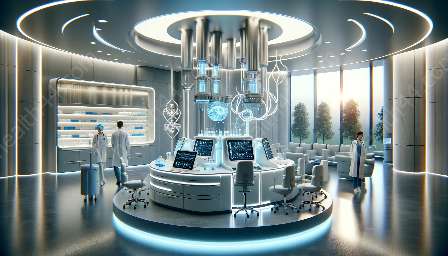Medical laboratory technology is a crucial component of modern healthcare systems. It encompasses a wide range of laboratory techniques and procedures that play a vital role in the diagnosis, treatment, and prevention of diseases. From conducting tests to analyzing samples, medical laboratory technologists and technicians are integral members of healthcare teams, working behind the scenes to provide accurate and reliable laboratory results that inform clinical decisions.
The Basics of Medical Laboratory Technology
Medical laboratory technology, also known as clinical laboratory science, encompasses various disciplines such as clinical chemistry, hematology, immunology, microbiology, and molecular diagnostics. These disciplines involve the analysis of body fluids, tissues, and cells to provide valuable information to physicians and other healthcare professionals.
Clinical Chemistry
Clinical chemists analyze blood, urine, and other body fluids to measure levels of various compounds such as glucose, electrolytes, and hormones. These measurements are essential for diagnosing and monitoring diseases such as diabetes, kidney disorders, and hormonal imbalances.
Hematology
Hematologists focus on the study of blood and blood-forming tissues. They analyze blood cells and their characteristics to diagnose conditions such as anemia, leukemia, and clotting disorders.
Immunology
Immunologists investigate the immune system's response to foreign substances and infectious agents. They perform tests to diagnose autoimmune disorders, allergies, and infectious diseases.
Microbiology
Microbiologists study microorganisms such as bacteria, viruses, fungi, and parasites. They play a critical role in identifying and characterizing infectious agents, guiding appropriate treatment strategies.
Molecular Diagnostics
Molecular diagnosticians utilize advanced techniques to analyze DNA, RNA, and proteins, aiding in the detection and monitoring of genetic diseases, cancer, and infectious agents at the molecular level.
The Impact of Medical Laboratory Technology on Health
The contributions of medical laboratory technology are far-reaching, influencing various aspects of healthcare and medical laboratory sciences.
Precision Medicine
Advances in medical laboratory technology have paved the way for precision medicine, allowing healthcare providers to tailor medical treatment and interventions to individual patients based on their genetic makeup, molecular profile, and other specific characteristics. This personalized approach enhances treatment efficacy and minimizes potential adverse reactions.
Disease Surveillance and Outbreak Response
Medical laboratory technology plays a crucial role in disease surveillance and outbreak response. By swiftly identifying pathogens and monitoring their spread, medical laboratory professionals contribute to the early detection and containment of infectious diseases, safeguarding public health.
Therapeutic Drug Monitoring
Medical laboratory technologists monitor drug levels in the blood to ensure that patients receive optimal doses of medications while minimizing the risk of toxicity. This practice is particularly important for drugs with narrow therapeutic windows, where slight dosage adjustments can significantly impact patient outcomes.
Transfusion Medicine
Within transfusion medicine, medical laboratory technology is essential for ensuring the compatibility and safety of blood products for transfusion, preventing adverse transfusion reactions and improving patient outcomes.
Challenges and Innovations in Medical Laboratory Technology
Despite its critical role in healthcare, medical laboratory technology faces various challenges, along with ongoing innovations that drive the field forward.
Challenges
- Staff Shortages: The field of medical laboratory technology often experiences shortages of qualified professionals, which can strain existing healthcare systems and lead to delays in test results.
- Quality Assurance: Maintaining high standards of accuracy and precision is essential in medical laboratories. Continuous efforts are required to ensure quality assurance and mitigate the risk of errors.
- Technological Complexity: As medical laboratory technology evolves, laboratories must adapt to increasingly complex instrumentation and methodologies, necessitating ongoing training and education for laboratory personnel.
- Regulatory Compliance: Compliance with stringent regulatory requirements is a constant challenge for medical laboratories. Adhering to regulations and standards is vital to ensure the reliability and validity of laboratory results.
Innovations
- Automation and Robotics: Automation technologies are streamlining laboratory workflows, reducing manual intervention, and improving efficiency while maintaining the accuracy of test results.
- Next-Generation Sequencing: Advances in genomic technologies, such as next-generation sequencing, are revolutionizing molecular diagnostics, enabling detailed genetic analysis and enhancing our understanding of genetic diseases.
- Point-of-Care Testing: The development of portable and rapid diagnostic devices has extended laboratory testing beyond traditional laboratory settings, providing immediate results at the point of care.
- Artificial Intelligence: AI-driven algorithms and machine learning are being integrated into laboratory systems to enhance data analysis, interpretation, and predictive modeling, facilitating more informed clinical decision-making.
The Future of Medical Laboratory Technology
The future of medical laboratory technology is characterized by continued innovation, expansion into new frontiers, and the integration of advanced technologies into routine practice.
Personalized Diagnostics and Treatment
Advancements in medical laboratory technology will further enable personalized diagnostics and treatment strategies, harnessing the power of genomics, proteomics, and metabolomics to tailor medical interventions to individual patients' specific needs.
Remote and Point-of-Care Testing
Technological advancements will facilitate remote testing capabilities, enabling healthcare providers to conduct diagnostic tests and monitor patients' health status outside traditional laboratory settings, leading to improved accessibility and timely interventions.
Data Integration and Analytics
Integration of diverse sources of health data, coupled with advanced analytics, will enhance the interpretation and utilization of laboratory results, enabling deeper insights into disease patterns, treatment outcomes, and public health trends.
Interdisciplinary Collaboration
The future landscape of medical laboratory technology will foster greater collaboration between laboratory professionals, clinicians, bioinformaticians, and other healthcare stakeholders, promoting a multidisciplinary approach to advancing healthcare outcomes.
Conclusion
Medical laboratory technology is a dynamic and indispensable component of health and medical laboratory sciences, encompassing a broad spectrum of techniques and disciplines that contribute to the understanding, diagnosis, and treatment of diseases. As technology continues to evolve and intersect with other domains of healthcare, it holds the potential to drive innovations, improve patient care, and shape the future of medicine.


